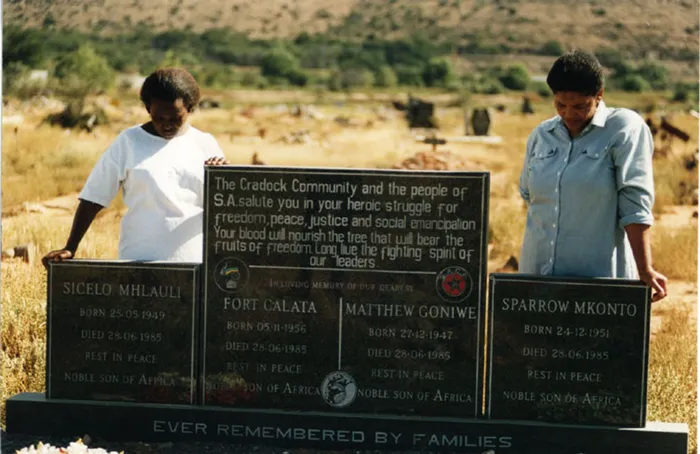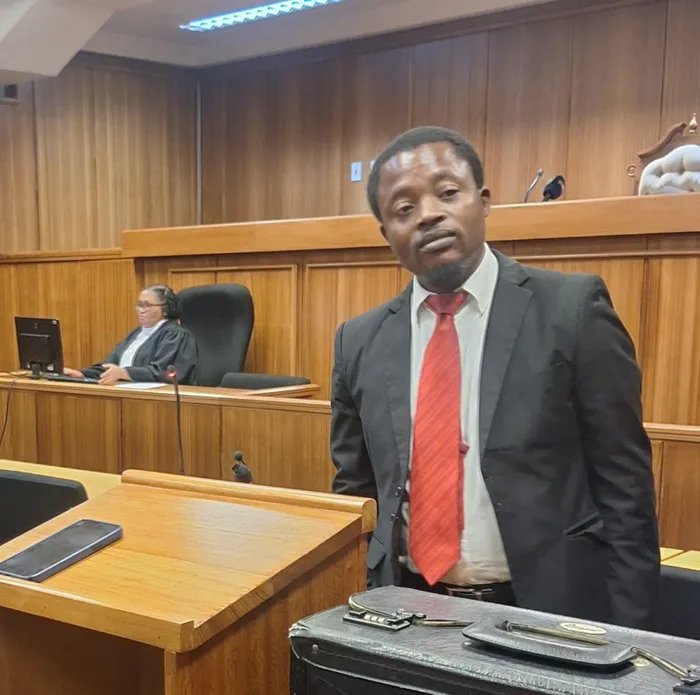Cradock four inquest faces another hurdle

The graves of Sicelo Mhlauli, Fort Calata, Matthew Goniwe and Sparrow Mkhonto, known as the Cradock Four. The four men were killed by security forces in June 1985.
Image: File picture: Benny Gool/Independent Media Archives
CONTINUED delays in securing legal representation for former Lieutenant General Christoffel Pierre “Joffel” van der Westhuizen, the man who allegedly authorised the deadly signal to permanently remove the Cradock Four, carry “disastrous potential,” says Judge Thami Beshe.
Van der Westhuizen, now 83, was the commanding officer of the Eastern Province Command and a member of the Joint Management Committee, a structure of the State Security Council (SSC) at the time Fort Calata, Matthew Goniwe, Sparrow Mkhonto and Sicelo Mhlauli (known as Cradock Four), were killed.
Van der Westhuizen ordered the signal on 7 June 1985 to urgently “permanently remove” the Cradock Four “from society”. This was to be sent to the head of the Secretariat of the SSC.
According to the Foundation For Human Rights, the 1994 inquest under Judge Neville Zietsman found that it had been established prima facie that the murderers were members of the security forces; and that a “case of suspicion” had been made out against certain police and army officers, including Van der Westhuizen.
Judge Zietsman found that the signal was intended to mean that Goniwe and the others should be killed and also that this was the meaning that Brigadier Van der Westhuizen intended should be conveyed in the signal.
Van der Westhuizen never applied for amnesty before the TRC.
The inquest into the 1985 deaths of the Cradock Four recently resumed in the Gqeberha High Court between June 2 to 11. This phase included only the testimonies of the victims’ families and their witnesses.
Former state officials, including van der Westhuizen are scheduled to proceed with their testimonies from October 13 to 24. However, there is a risk of further postponement unless the issue of legal funding for the implicated former apartheid officials is resolved.
Head of the South African National Defence Force (SANDF)'s deputy director for litigation, Masilo Lekoloana took the witness stand after he had been subpoenaed to appear before the Gqeberha High Court.

Head of the South African National Defence Force (SANDF)'s deputy director for litigation, Masilo Lekoloana took the witness stand after he had been subpoenaed to appear before the Gqeberha High Court.
Image: Nicola Daniels
The court wanted an explanation for the SANDF’s refusal to fund Van der Westhuizen’s legal representation.
Prosecutor Jannie Coltman told the court the case had been delayed for many years and the families of the victims had testified that these delays prevented them from getting closure.
Lekoloana confirmed that the application had been declined but he did not believe this could disturb or delay proceedings.
"Where I am sitting I am not in a position to disturb or delay proceedings.," he testified.
He said the reasons had been provided to the applicant, Van der Westhuizen.
Coltman noted that SAPS had also declined to provide Van der Westhuizen with legal funding.
Lekoloana’s lawyer George Avvakoumides said: "It is true the application was rejected after an administration decision. Whoever is affected has the ability to challenge that decision."
Van der Westhuizen had taken the decision to refuse him legal representation on review in the Gauteng High Court in Pretoria. The SANDF is opposing the matter. A date for the case in Pretoria was yet to be set.
Avvakoumides said if Van der Westhuizen took steps to expedite the matter they would cooperate.
Judge Beshe noted that if the matter concerning Van der Westhuizen's legal representation is not finalised, it has "disastrous potential. However the reopened inquest is set to continue in October, said the judge adding that , hopefully there will be some movement by then.
Cape Times